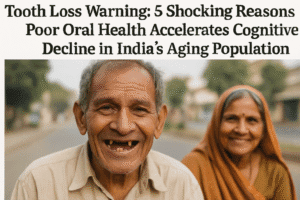Tooth Loss Warning: 5 Shocking Reasons Poor Oral Health Accelerates Cognitive Decline in India’s Aging Population
India’s aging population is facing a hidden threat to brain health—poor oral hygiene. A landmark study based on over 56,000 adults from the Longitudinal Aging Study reveals a striking link between tooth loss and cognitive decline. Adults with full tooth loss performed significantly worse on memory and problem-solving tests, with effects comparable to aging 5–6 additional years. Missing teeth not only reduce nutritional intake but also limit brain stimulation and trigger chronic inflammation, all of which contribute to neurodegeneration.
Despite the urgency, dental care remains scarce, especially in rural areas, where only 3% of seniors have insurance and dentist-to-patient ratios are alarmingly low. Cultural norms often normalize tooth loss, delaying treatment until it’s too late. Experts urge integrating dental checks into primary care, expanding rural services, and launching public awareness campaigns. Addressing oral health is no longer optional—it’s essential for preserving cognitive function and quality of life in India’s elderly.

Tooth Loss Warning: 5 Shocking Reasons Poor Oral Health Accelerates Cognitive Decline in India’s Aging Population
India’s population is aging rapidly, with adults over 60 projected to nearly triple by 2050. Alongside this demographic shift, dementia and cognitive impairment are rising—yet one overlooked factor could play a surprising role: oral health. A groundbreaking study using India’s first nationally representative data reveals a clear link between tooth loss and reduced cognitive function in adults aged 45 and older, shedding light on an urgent public health priority.
The Study: Connecting Teeth and Brain Health
Published in Scientific Reports, the research analyzed data from over 56,700 participants in India’s Longitudinal Aging Study (2017–2018). Cognitive function was assessed through memory, orientation, and problem-solving tests, while oral health measures included self-reported tooth loss, gum disease, and other dental issues. Key findings include:
- Tooth Loss Matters: Adults who lost all teeth scored 0.65 points lower on cognitive tests than those with natural teeth—a gap comparable to the impact of 5–6 years of aging. Even partial tooth loss reduced scores by 0.36 points.
- An Unexpected Twist: Surprisingly, adults with multiple oral conditions (e.g., bleeding gums, cavities) had higher cognitive scores than those with none. Researchers speculate this could reflect greater health awareness or transient issues not yet impacting nutrition.
- Socioeconomic Links: Lower education, rural residence, and poverty correlated with poorer cognitive outcomes, highlighting systemic inequities in healthcare access.
Why Oral Health Impacts the Brain
The study aligns with global research suggesting several mechanisms:
- Nutritional Pathways: Missing teeth hinder chewing, leading to poor diet and deficiencies in brain-protective nutrients like vitamins B12 and D.
- Chronic Inflammation: Gum disease releases inflammatory markers linked to neurodegeneration, potentially accelerating conditions like Alzheimer’s.
- Sensory Feedback: Chewing stimulates brain regions involved in memory and learning. Tooth loss may reduce this stimulation, contributing to decline.
India’s Oral Health Crisis: A Silent Epidemic
India faces a dual challenge: 30% of seniors have lost all teeth, yet dental care remains inaccessible for many. Only 3% have dental insurance, and rural areas—home to 70% of the population—have just 1 dentist per 120,000 people. Cultural perceptions also play a role; many view tooth loss as inevitable with age, delaying treatment until problems become severe.
“Oral health is a window to overall well-being,” says Dr. Bei Wu, a study co-author and global health researcher. “Neglecting it—especially in aging populations—risks compounding India’s dementia burden.”
Policy Implications: Bridging the Gap
The study calls for urgent action:
- Integrate Dental and General Healthcare: Train primary providers to screen for oral issues during routine check-ups.
- Expand Rural Access: Incentivize dentists to work in underserved areas through scholarships or loan forgiveness.
- Public Awareness Campaigns: Combat myths about aging and oral health, emphasizing prevention and early treatment.
- Affordable Solutions: Promote community-based initiatives, like mobile dental clinics and subsidized dentures for seniors.
The Road Ahead
While the study’s cross-sectional design can’t prove causation, it underscores oral health as a modifiable risk factor for cognitive decline. Future research will explore whether interventions like dentures or periodontal treatment can mitigate dementia risk.
For India, addressing oral health isn’t just about teeth—it’s about safeguarding the minds of its aging population. As Dr. Uma Kelekar, the study’s lead author, notes: “A healthy smile could be a powerful tool in preserving independence and quality of life for millions.”
You must be logged in to post a comment.